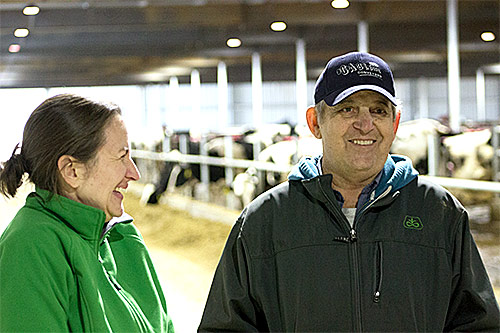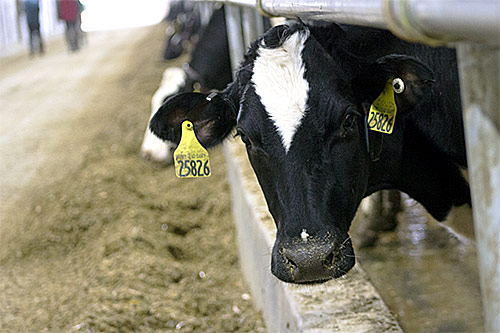Fourth-generation farmer Floyd Houin’s family dairy doesn’t simply provide a way of life. It is life. He started in the family tradition when he was six — feeding the chickens, hogs, and cattle on the farm. He and his brother Dan bought out their dad to take over the family dairy in 1979, and today Floyd co-owns Plymouth, Ind.-based Homestead Dairy with his wife and sister-in-law. The business employs more than 40 people, including multiple generations of Houin’s relatives.
To preserve the family tradition, Houin has consistently planned for the future. In spring 2017, the business opened a new $15 million, 381,000-square-foot dairy expansion featuring 24 robotic stalls that automate every step of the milking process — a new technology for the dairy on a scale not previously seen.
“It’s a marker for what can be done in the dairy business,” said Mark Batman, CEO of Marshall County REMC, which supplies electricity to Homestead Dairy. “They’re attracting a lot of attention.” The robotic stalls uniquely identify, wash, and milk the cows, and the stalls’ computers measure and record the milk each cow provides daily. The cows learn to visit a stall each time they want to be milked, resulting in a more natural environment that improves the milk yield.

“There’s an awful lot of interest in managing the risk of a shrinking labor supply, so of course that means that farmers will be moving steadily away from conventional parlors,” said Schutz, who also had a class of students visit the dairy. “If this is shown that it can be worked on a large scale like Homestead is trying, then it becomes a lot more palatable to people.”
Houin collaborated with Marshall County REMC on upgrades through POWER MOVES®, an energy efficiency program offered by the electricity co-op. Homestead Dairy received $125,000 in rebates for efficiency upgrades that include LED lighting, which is more robust and has longer service life than traditional light bulbs, and variable frequency drives installed on fans to ensure proper airflow without wasting energy.
Marshall County REMC officials also collaborated with Houin and Jerry Chavez, president and CEO of Marshall Co. Economic Development Corp., to secure tax abatements, which phase in taxes over time to support the expansion. About half of the new taxes were abated, Chavez said.
“If you want to stay in business long-term, you need to keep your costs low,” Houin said. “The tax abatements are going to help reduce costs, especially in the initial start-up phase.”
Homestead Dairy hired new employees as a result of growth from the expansion, which Houin also expects will enable “more family members to come back into the business… We’ve got junior partners, and I have grandchildren who may be interested in coming back,” Houin added. “Hopefully this expansion will help keep the farm in the family for a lot longer.”
- PROJECT
- Creation of a new $15 million, 381,000-square-foot dairy featuring 24 robotic stalls, the largest robot dairy in the U.S. when it opened
- LOCAL PARTNERS
- Marshall County REMC
- Marshall County Economic
- Development Corporation
- PARTNERSHIP HIGHLIGHTS
- Installation of LED lighting, saving 945,042 kWh of electricity per year through POWER MOVES®
- Installation of variable frequency drives to make fans more efficient, saving an estimated 155,156 kWh annually through POWER MOVES®
- Collaboration with local economic development officials on real and personal property tax abatement
- FINANCIAL IMPACT
- $125,000 POWER MOVES® rebate for energy efficiency improvements
- Estimated $110,000 per year in energy savings
- Half of new personal and property taxes abated
